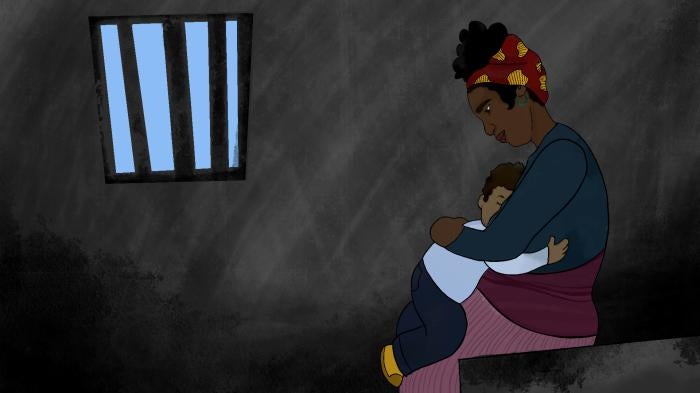The Devastating Impact of Criminalizing Abortion in Ecuador
Read a text description of this video
Voiceover:
“Maria” was 20 years old when she spent four months in a prison cell with her three-year-old son. While at work one day, she slipped and fell down the stairs. She started bleeding and was in pain.
She went to the hospital and learned she was having a miscarriage. Prior to this moment, she didn’t know she was pregnant.
The doctors told her everything was okay, but she was later arrested for allegedly having an abortion.
Ana Vera, Lawyer:
In Ecuador, women cannot be arrested for having an abortion in certain cases.
The first is when the life or health of a woman is in danger that cannot be avoided by other means. And the second is when the pregnancy is the result of rape.
However, what usually happens is that mental and social health, for example, are not taken into account.
Voiceover:
“Soledad” was 38 years old when she found out she was pregnant with her first child. This was a wanted, planned and welcomed pregnancy for “Soledad” and her husband.
One day, she felt a sharp pain which made her go to the bathroom. She gave birth prematurely there and lost her daughter.
When she got to the hospital, the doctors assumed she had induced an abortion and they called the police. She was taken to prison.
From the 148 cases reviewed by Human Rights Watch, 73 percent of the prosecutions for alleged abortion were initiated after a health care provider reported a patient to the police in violation of medical confidentiality.
Dr. Susana Guijarro:
The professionals working in the health system are very afraid of being prosecuted of being imprisoned because they are also unclear about the law.
Voiceover:
In the cases where health care workers reported their patients, they were violating legal requirements protecting medical confidentiality.
Women and girls accused of abortion are often deprived of proper post-abortion care and encounter violations of their due process rights as well as barriers to accessing good quality legal representation.
Even though “Soledad” continued to bleed for days in prison, no doctor came to care for her or make sure she was safe.
The prosecutor charged her with aggravated homicide. She faced being sentenced up to 26 years in prison. She was found not guilty at her trial. By then, she had already spent five months in jail.
Ana Vera, Lawyer:
The criminalization of abortion is a matter of social injustice, where the most impoverished women suffer the most consequences.
Dr. Susana Guijarro:
The poorest women don't have any access (to abortion) and they have to seek methods, the most inadequate methods, which lead to infections which can even lead to death.
Voiceover:
“Elena” was 21 years old, married, living in poverty, and with a child when she was raped and became pregnant. She knew her reputation would be ruined if word got out that she was pregnant with someone else's child.
“Elena” took medication to end her unintended pregnancy. In Ecuador one in four women experience sexual violence.
Until April 2021, abortion after rape was criminalized unless the pregnant person had an intellectual disability.
Ana Vera, Lawyer:
Women are very afraid to report situations of sexual violence when they become pregnant because they think that they are the ones who may be prosecuted.
All the fear and the stigma that exists for victims of sexual violence is compounded by the fear and the stigma that exists about abortion.
Voiceover:
When “Elena” started having severe stomach pain and cramps, she went to a public hospital. The doctors who were treating her reported her to the police. She was arrested and placed on trial.
She told the judge: “Yes I used the pills. I didn’t want to have [the baby] because it was the product of rape. I didn’t want my family to find out.”
She was sentenced to 12 months in prison and was released after seven months due to good behavior. Her allegations of sexual violence were never investigated.
Ana Vera, Lawyer:
I believe that the criminalization of abortion is not an effective measure for anything; neither to reduce the number of abortions, nor to prevent women from getting pregnant, nor to prevent sexual violence.
I think it is a violation of human rights, but the denial of legal abortions could even constitute a form of torture, cruel, inhuman and degrading treatment, according to international standards.
Voiceover:
The criminalization of abortion has a devastating impact on the lives and health of women and girls.
The Ecuadorian Constitutional Court’s ruling to decriminalize abortion in all cases of rape is an important step.
Newly elected legislators and resident Guillermo Lasso should remove all criminal penalties for abortion and guarantee effective access to abortion on all legal grounds.
(Washington, D.C., July 14, 2021) – Ecuador’s laws criminalizing abortion violate the rights and risk the lives and health of women and girls, Human Rights Watch said in a report released today.
The 128-page report, “‘Why Do They Want to Make Me Suffer Again?’ The Impact of Abortion Prosecutions in Ecuador,” documents how these laws are having widespread harmful consequences in Ecuador, costing lives through increased maternal mortality and morbidity, cutting women and girls off from essential services, and undermining broader efforts to promote sexual and reproductive health. Women and girls charged with abortion often experience violations of their rights to medical confidentiality and due process, and face significant obstacles to accessing quality legal representation. The prosecutions affect not only women who wish to end an unwanted pregnancy but also those who experience miscarriages or obstetric emergencies, or urgently require post-abortion care.

